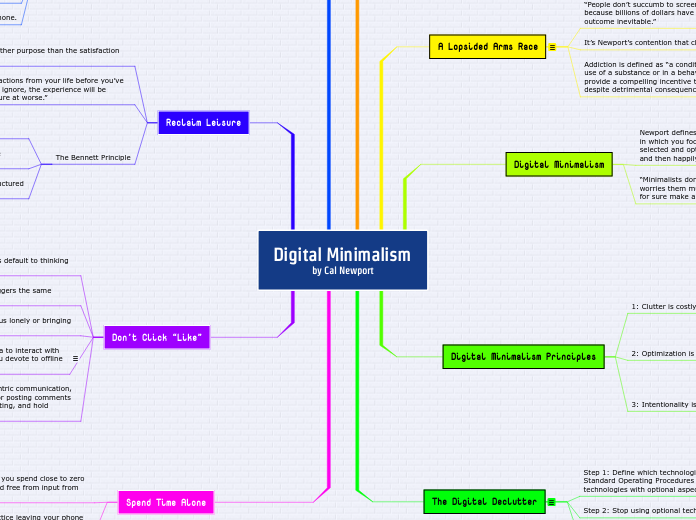Digital Minimalism
by Cal Newport
Spend Time Alone
To practice Solitude Deprivation, practice leaving your phone at home, taking long walks, and writing letters.
Solitude Deprivation: A state in which you spend close to zero time alone with your own thoughts and free from input from other minds.
Don’t Click “Like”
To subscribe to conversation-centric communication, avoid clicking the “like” button or posting comments on social media, consolidate texting, and hold conversation office hours.
“The more you use social media to interact with your network, the less time you devote to offline communication.”
As Newport writes, “The small boosts you receive from posting on a friend’s wall or liking their latest Instagram photo can’t come close to compensating for the large loss experienced by no longer spending real-world time with that same friend.”
“Social media is either making us lonely or bringing us joy.”
The loss of social connection triggers the same system as physical pain.
When given downtime, our brains default to thinking about our social life.
Reclaim Leisure
The Bennett Principle
Seek activities that require real-world, structured social interactions.
Use skills to produce valuable things in the physical world; and
Prioritize demanding activity over passive consumption;
“If you begin decluttering the low-value digital distractions from your life before you’ve convincingly filled in the void they were helping you ignore, the experience will be unnecessarily unpleasant at best and a massive failure at worse.”
“A life well lived requires activities that serve no other purpose than the satisfaction that the activity itself generates.”
to Join the Attention Resistance
The “attention economy” describes the business sector that makes money gathering consumers’ attention and then repackaging and selling it to advertisers.
Dumb down your smartphone.
Embrace slow media; and
Use social media like a professional;
Turn your devices into single-purpose computers;
Delete social media from your phone;
The Digital Declutter
“The digital declutter focuses primarily on new technologies, which describes apps, sites, and tools delivered through a computer or mobile phone screen. You should probably also include video games and streaming video in this category.”
“You will probably find the first week or two of your digital declutter to be difficult, and fight urges to check technologies you’re not allowed to check. These feelings, however, will pass, and this resulting sense of detox will prove useful when it comes time to make clear decisions at the end of the declutter."
Step 3: decide which technologies to reintroduce.
After reintroducing technology, ask yourself,
- Does this technology directly support something that I deeply value?
- Is this technology the best way to support this value?
- How am I going to use this technology going forward to maximize its value and minimize its harms?
To allow an optional technology back into your life at the end of the digital declutter, it must:
- Serve something you deeply value (offering some benefit is not enough);
- Be the best way to use technology to serve this value (if it’s not, replace it with something better); and
- Have a role in your life that is constrained with a standard operating procedure that specifies when and how you use it.
Step 2: Stop using optional technology for 30 days.
“During this month-long process, you must aggressively explore higher-quality activities to fill in the time left vacant by the optional technologies you’re avoiding.
Step 1: Define which technologies are optional to you. Write Standard Operating Procedures for handling non-optional technologies with optional aspects.
Digital Minimalism Principles
3: Intentionality is satisfying.
“Digital minimalists derive significant satisfaction from their general commitment to being more intentional about how they engage with new technologies. This source of satisfaction is independent of the specific decisions they make and is one of the biggest reasons that minimalism tends to be immensely meaningful to its practitioners.”
2: Optimization is important.
“Digital minimalists believe that deciding a particular technology supports something they value is only the first step. To truly extract its full potential benefit, it’s necessary to think carefully about how they’ll use the technology.”
1: Clutter is costly.
“Digital minimalists recognize that cluttering their time and attention with too many devices, apps, and services creates an overall negative cost that can swamp the small benefits that each individual item provides in isolation.”
Digital Minimalism
“Minimalists don’t mind missing out on small things,” writes Newport. “What worries them much more is diminishing the large things they already know for sure make a good life good.”
Newport defines Digital Minimalism as, “A philosophy of technology use in which you focus your online time on a small number of carefully selected and optimized activities that strongly support things you value, and then happily miss out on everything else.”
A Lopsided Arms Race
After reviewing the relevant psychology literature and interviewing relevant people in the technology world, author Adam Alter discovered that:
- Our new technologies are particularly well suited to foster behavioral addictions; and
- In many cases, these addictive properties of new technologies are carefully engineered design features.
Tech companies encourage behavioral addiction through:
- Intermittent positive reinforcement; and
- The drive for social approval.
Addiction is defined as “a condition in which a person engages in use of a substance or in a behavior for which the rewarding effects provide a compelling incentive to repeatedly pursue the behavior despite detrimental consequences.”
It’s Newport’s contention that checking “likes” is the new smoking.
“People don’t succumb to screens because they’re lazy, but instead because billions of dollars have been invested to make this outcome inevitable.”
Highly recommended for people
Newport is convinced that we need “a full-fledged philosophy of technology use, rooted in your deep values, that provides clear answers to the questions of what tools you should use and how you should use them and, equally important, enables you to confidently ignore everything else.”
who are trying to implement more deep work into their life.
who want to overcome digital addiction.
who feel like their technology use is out of control.









